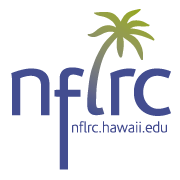The University of Hawai‘i has once again been selected to serve as one of a small number of national Language Resource Centers (LRC) established to improve the learning and teaching of foreign languages throughout the US, particularly less commonly taught languages. The university will receive an estimated total of $624,000 to cover operations of the National Foreign Language Resource Center (NFLRC) from 2018 to 2022. This brings the total amount awarded to the NFLRC to date to over $10 million, not counting money brought in through other grants linked to NFLRC projects. Julio C Rodríguez (Center for Language & Technology) is the Director of the NFLRC, and Ruslan Suvorov (Center for Language & Technology) is the Associate Director.
The US Department of Education’s Title VI LRC program began in 1990 with the funding of three centers, including ours at the University of Hawai‘i at Mānoa. With each funding cycle, the number of centers has increased, and there are now 16 in all (see list below). The UH Mānoa NFLRC remains the only LRC in the nation to have been funded in every cycle since the program’s inception and will celebrate its 30th anniversary in 2020.
NFLRC projects are founded upon expertise in language pedagogy, applied linguistics, and instructional technology and include faculty and students from most of the departments in the UH Mānoa College of Languages, Linguistics & Literature.
The major projects for 2018-2022 include:
- Project-based Language Learning (PBLL)*: Continuing its groundbreaking work on PBLL, the NFLRC will utilize the wealth of materials on project design created during its many online and in-person PBLL professional learning experiences during the last grant cycle to serve as the foundation for exciting new professional learning opportunities in 2018–2022. Once developed, they will include nationwide annual PBLL offerings of two 3-week MOOCs (massive open online courses) on Envisioning PBLL and Designing PBLL respectively, short courses on special topics in PBLL, summer institutes, and the establishment of a mentoring program for teachers.
- Blended Learning*: In the context of language education, blended learning entails the leveraging of technology to provide learners with language input as well as metalinguistic knowledge during out-of-class time so that maximal in-class time can be devoted to communicative language use (negotiation of meaning), which is widely acknowledged as a necessary condition for language acquisition. Plans include the development and offering of a Blended Learning Pedagogy (BLP) online MOOC, a model blended learning curriculum for first and second year Chinese, a Teacher Portfolio & Preparation Series (TiPPS) online MOOC, and a workshop on pedagogical innovations in Korean language education.
- Online Language Pedagogy*: Since an ever-growing contingent of world language educators find themselves teaching world languages online without having received adequate preparation in pre- or in-service contexts, the need for professional development in this area is clear. The NFLRC will continue the development and offering of new online modules focused on new areas of importance in online language pedagogy. As with the majority of NFLRC projects, materials created will be available as open educational resources (OERs).
- Research Dissemination: The NFLRC will publicize the products of its scholarship and disseminate the training tools it develops through conferences, publications, openly available Web-based resources and tools, and the common LRC portal. It will continue its support of the refereed open online journals Language Learning & Technology (LL&T), Language Documentation & Conservation (LD&C), and Reading in a Foreign Language (RFL), as well as its NFLRC Monographs Series and its NFLRC Pragmatics & Language Learning Series. In addition to its support of local conferences in Hawai‘i, the NFLRC will help co-organize and co-host the following international events: International Conference on Language Documentation & Conservation (ICLDC) in 2019 and 2021, Southeast Asian Linguistics Society (SEALS) Conference in 2020, and the International Conference on Pragmatics & Language Learning (PLL) in 2022.
* All NFLRC professional development activities are associated with corresponding achievement credentials granted by the NFLRC.
2018-2022 LRCs
- AELRC (Assessment and Evaluation Language Resource Center), Georgetown University
- CALPER (Center for Advanced Language Proficiency Education and Research), Pennsylvania State University
- CASLS (Center for Applied Second Language Studies), University of Oregon
- CERCLL (Center for Educational Resources in Culture, Language and Literacy), University of Arizona
- CeLCAR (Center for Languages of the Central Asian Region), Indiana University
- COERLL (Center for Open Educational Resources & Language Learning), University of Texas at Austin
- CULTR (Center for Urban Languages and Research), Georgia State University
- NALRC (National African Language Resource Center), Indiana University
- NEALRC (National East Asian Languages Resource Center), Ohio State University (OSU)
- NFLRC (National Foreign Language Resource Center), University of Hawaii (UH)
- NHLRC (National Heritage Language Resource Center), University of California, Los Angeles
- NRCAL (National Resource Center for Asian Languages), California State University, Fullerton (CSUF)
- OLRC* (Open Language Resource Center), University of Kansas
- PEARLL* (Professionals in Education Advancing Research and Language Learning), University of Maryland
- SEELRC (Slavic and East European Language Research Center), Duke University (Duke)
- L2TReC * (Second Language Teaching & Research Center), University of Utah
* indicates a new LRC
Related Stories
Related News
UH Mānoa earns $5M in grants for excellence in international education

